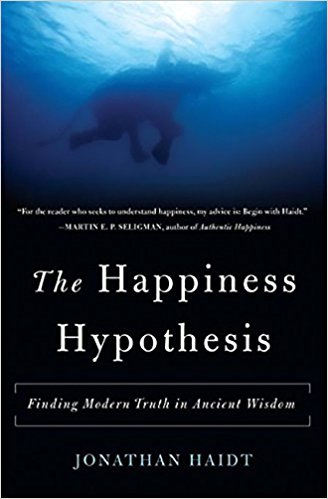DEFINITIVE The Happiness Hypothesis Summary
5 min read ⌚
MicroSummary: As he suggests in the subtitle, in “The Happiness Hypothesis”, social psychologist Jonathan Haidt tries to find modern truth in ancient wisdom. He examines the worldviews of the greatest thinkers in history (Plato, Jesus, Buddha, Democritus, Pythagoras…) and devises a scientific formula for happiness and fulfillment.
Finding Modern Truth in Ancient Wisdom
Happiness is a term used by many people explained in billions of different ways all trying to clarify the meaning of life. We can all agree, that happiness is more than a feeling, so it mustn’t be defined as a phenomenon with a time-limit.
Our book summary takes you on a new unforgettable journey that will enable you to discover the depths of happiness.
Who Should Read “The Happiness Hypothesis”? And Why
Ancient philosophy is perhaps the most interesting matter that yet, remains a mystery. For a person to start reading this kind of books, it must quickly absorb theories which indicate – philosophy and the concept of happiness are not scientific facts.
Stay with us to learn more:
It is a way of life, an inner mentality that can be followed by anyone. Neither Buddha, nor Plato, nor any other philosopher limits its work to particular nations, cultures, religions- the same thing goes for Jonathan Haidt.
“The Happiness Hypothesis” as its name implies attempts to guide the readers in order to reach the ultimate level of satisfaction. It tries to show any male, female, adult or teenager that they are worthy of having a better life by simply understanding their nature. As Buddha once told us- If you don’t believe in happiness, what gives you the right to seek it?
About Jonathan Haidt
 Jonathan Haidt is an American-born author, psychologist and a motivator; he was born on October 19, 1963, in New York City to a Jewish family. Shortly after graduating from the University of Pennsylvania he continued his studies at the University of Chicago.
Jonathan Haidt is an American-born author, psychologist and a motivator; he was born on October 19, 1963, in New York City to a Jewish family. Shortly after graduating from the University of Pennsylvania he continued his studies at the University of Chicago.
For 16 years he worked as an associate professor at the University of Virginia where he received multiple awards for teaching and as a social psychologist. Jonathan despite being the author of “The Happiness Hypothesis” he is also the co-author and editor of “Positive Psychology and the Life Well-Lived.”
“The Happiness Hypothesis Summary”
When we hear the word wisdom, the first thing that comes up to our minds is that it’s something different than a concept, something that is relative and something that is entirely mysterious even in the digital era.
Perhaps because of this, the people have issues, and they rarely stop to savor an excellent idea to feel that inner wisdom as something more profound. The well-known American author Jonathan Haidt provides a solution and an internal remedy for contemporary habits that occur in modern society.
The one-dimensional and shallow thinking according to Jonathan must be replaced with the wisdom presented by the greatest ancient philosophers, with their methods of contemplating one’s inner self to achieve a peaceful state of mind and a transformed mindset. A lot of things bother the today’s average person, one of them is the constant workaholic attitude that a regular person has developed by giving his time and energy cheaply.
Here’s the kicker:
“The Happiness Hypothesis” demonstrates that some issues that existed through ages are still worth kicking around in the modern era – like this one. This book can help those “endangered corporate slaves” to understand why they cannot change their lives so quickly and why happiness is hard to attain.
It will provide a lot of thinking time for you, where you’ll need to stop for a moment, take a deep breath and assess the possibilities that your life carries. At the least, it will point out that rash decisions and a fast tempo can’t change your life course.
Why focus on philosophy?
Plato, Buddha, Democritus and even Pythagoras tried to describe the inner self. According to Plato, the ego or the developed spiritual character is a charioteer, that carries the actual self in it, free of passions and desires. That true self is covered with a blanket that represents an outer surface of ego (or in this case the charioteer represents the blanket).
Buddha, for example, insisted that every human being is born with one purpose- to disregard his made up a character and to seek the inner self through meditation and gradual contemplation.
This is crazy:
Democritus had placed its focus on material nature; he thought that even the inner self is also material and according to our books he is the father of Atomic hypothesis.
Key Lessons from “The Happiness Hypothesis”
- Emotional Patterns and deeper understanding
- Why the Psychology’s Happiness Formula has such an impact on our lives
- Different bonds and different relationships have different impact on person’s well-being
Emotional Patterns and deeper understanding
In the godly kingdom, only the humans among all beings are capable of interacting in a variety of ways. We as social creatures have a constant need to exchange vibes and to have sexual intercourse to feel happy. The parent-child relationship is among the leading elements that build the foundation of a happy and cheerful person. By understanding, those emotional patterns that we develop over the years, a person can have total control of his/her inner state.
Why the Psychology’s Happiness Formula has such an impact on our lives
You have probably heard about the Positive psychology’s “happiness formula.” It indicates that the happiness is the sum calculated from person’s genetic predispositions, his/her current living conditions, and his/her daily activities.
Although the foundation of a happy person is constructed by genetic attributes, other factors that can affect the course of a joyful individual are personal relationships and personal, spiritual or religious beliefs.
Different bonds and different relationships have different impact on person’s well-being
You must understand – the bond that exists between kin and friends is one thing, the relationship, and competition that is present among co-workers is something different. The third deeper dimension is the bond which exists between beings and God on a different level.
In Buddhist scriptures, according to the Buddha, this relationship is known as – enlightenment- meaning that the person is capable of interacting on a deeper scale with one’s inner self. However, this dimension is optional, because every individual believes in different things, based on his/her culture and parental upbringing.
Like this summary? We’d Like to invite you to download our free 12 min app, for more amazing summaries and audiobooks.
“The Happiness Hypothesis” Quotes
Love and work are to people what water and sunshine are to plants Share on X There is nothing either good or bad, but thinking makes it so. Share on X Each of us thinks we see the world directly, as it really is. We further believe that the facts as we see them are there for all to see, therefore others should agree with us. If they don’t agree, it follows either that they have not… Share on X If you are in passionate love and want to celebrate your passion, read poetry. If your ardor has calmed and you want to understand your evolving relationship, read psychology. But if you have just ended a relationship and would like… Share on X With such a vast and wonderful library spread out before us, we often skim books or read just the reviews. We might already have encountered the Greatest Idea, the insight that would have transformed us had we savored it, taken it to… Share on XOur Critical Review
Guided by our belief and experience, we think that this book offers a lot when it comes to developing a new mindset. However many self-help classics focus on similar subjects which call into question the book’s uniqueness, and self-reliance.
Emir is the Head of Marketing at 12min. In his spare time, he loves to meditate and play soccer.








